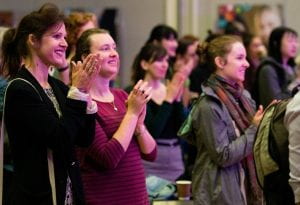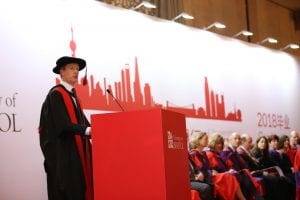 It’s a confusing time to be an advocate for internationalisation. Our societies, our economies and our popular culture are irrepressibly international, but the political discourse around us is intent on maligning it. As someone who has lived in nine countries (for an average of five years each!), multiculturalism is so ingrained in me that I stare agape at efforts to contain it.
It’s a confusing time to be an advocate for internationalisation. Our societies, our economies and our popular culture are irrepressibly international, but the political discourse around us is intent on maligning it. As someone who has lived in nine countries (for an average of five years each!), multiculturalism is so ingrained in me that I stare agape at efforts to contain it.
From where I sit, safeguarding the provision of an international and multicultural educational experience for all of our students is an absolute priority. That’s why I’m so pleased that, earlier this month, the Anson Rooms came alive with a distinctly international flavour when over 300 students and staff helped to launch the University of Bristol Global Lounge, a central component of our internationalisation strategy. For those who were unable to attend, a summary has been published on the staff and PGR intranet.
Although the University of Bristol has had a fundamentally international outlook since its establishment over 100 years ago, recent years have seen a more purposeful focus on internationalisation as a strategic priority at the institutional level. The Global Lounge concept speaks to two of the objectives in the current internationalisation strategy: to provide all students with an international and multicultural campus experience; and to ensure that our international students are well supported and integrated into the overall campus community. Having seen Global Lounges used to great effect at a number of universities around the world, most notably at University College Dublin, where I had the opportunity to open one in 2011, I have been convinced that Bristol, too, would benefit from having such a resource.

Ahead of the opening of its permanent home in Senate House in 2021, the Global Lounge will for now operate in pop-up mode from a variety of locations. This ‘moveable feast’ approach will not only allow the Global Lounge’s activities to become familiar to students and staff across the campus, it will also allow us to refine our understanding of the types of activities and physical infrastructure that we want to prioritise in due course in Senate House.
Far from being simply targeted at international students, the activities run under the Global Lounge umbrella are designed with the entire campus community in mind. A significant schedule of events will be developed with a view to celebrating diversity and multiculturalism on campus – events such as national day celebrations, major international events (including sporting competitions!) and religious holidays. It is a platform that can be used any anyone who wishes to promote or share globally themed activities, and it will also play a very important part in welcoming our growing international student population to the University and making sure that they have a home on campus. Please do contact our Global Lounge team if you have any ideas for events or initiatives that they could support.

The Global Lounge will also work with the wider Bristol community, charities and local organisations to provide an opportunity for the public to get involved in University life, and for our students to become more involved with their city.
This new resource can only exist through a strong collaboration with our Students’ Union. I’m delighted to see that Bristol SU and the Global Lounge have already established a strong partnership and are working together brilliantly on this initiative.
The Global Lounge website is now live. Take a look, book yourself a ticket to one of the exciting events that are lined up, and come and find out what Global Lounge is all about.
At a time when some of the loudest politicians advocate our becoming more insular, I stand firm in my support for an unashamedly international campus. The Global Lounge is a powerful expression of that intent.


